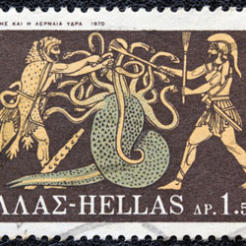They are thousands of years old, but the lessons from Greek mythology still ring true today. Reuben Turner looks at how they provide useful insight for fundraisers.
OK. I’m about a chapter into NN Taleb’s latest book ‘Antifragility’.
If I wait until I’ve finished it to write this, you will be reading it in about March 2014.
So I thought I’d share some initial insights now.
Taleb’s concept of antifragility is about how you go past resilience to create a mode of operating where you can benefit from shocks. It strikes me more and more that we in fundraising work hard to avoid shocks, upsets and unpredictability rather than benefit from them. I can give some examples, but right now I’ll illustrate the point using Taleb’s, which are drawn from classical mythology (he’s very well-read).
Damocles was an obsequious courtier who told the King how lucky he was to enjoy such wealth and power. So the king allowed him to enjoy a luxurious and never-ending feast, but only while sitting beneath a razor-sharp sword, suspended from the ceiling by a single horse-hair.
If you are an organisation that has worked hard to test and refine down to a single, hard-working, profitable source of income, that’s you. Rely on service income? It only takes a change of government. Rely on face-to-face? A single scandal, a piece of legislation, a supplier going bust, can take it all away. Rely on train panels? A restriction on media or a cultural shift can kill the cash cow – and you.
The Phoenix was a legendary bird that was able to survive being killed, by rising again from the ashes in a new form.
If you have a robust, mixed, resilient programme that continually tests new creative, asks and channels, that’s you. One of these might tire, fail, or be regulated out of existence at any time. But you always have a fall-back waiting in the wings. You’ve tested it and it’s ready to go.
Meanwhile, the Hydra was a mythical, multi-headed creature that could not be killed. Indeed, it benefitted from being attacked. When one head was lopped off, two grew back.
That’s a place many organisations would struggle to get to. But benefitting from the unexpected means being open to it. A few years ago WaterAid tested an insert called “52 million pounds a month”. It’s counter-intuitive, it breaks all the rules, and many professional fundraisers hate it. It also became their banker, beating a ten-year old control. They were open to the unexpected. And they still are.
So. Don’t be Damocles, please. Congratulations if you’re a Phoenix. But the question you should be asking is, how do you become a Hydra?









